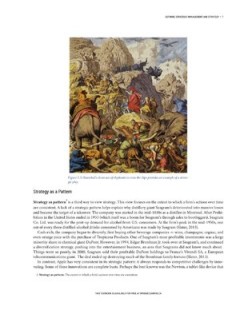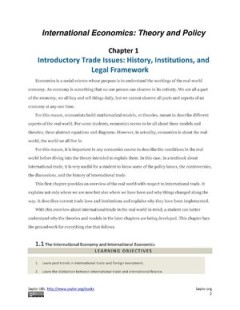Filter by

Risk Management in Crisis : Winners and Losers during the COVID-19 Pandemic
Risk management is a domain of management which comes to the fore in crisis. This book looks at risk management under crisis conditions in the COVID-19 pandemic context. The book synthesizes existing concepts, strategies, approaches and methods of risk management and provides the results of empirical research on risk and risk management during the COVID-19 pandemic. The research outcome was …
- Edition
- -
- ISBN/ISSN
- 9781000457285
- Collation
- -
- Series Title
- -
- Call Number
- 650

Mastering Strategic Management
Mastering Strategic Management is designed to enhance student engagement in three innovative ways. The first is through visual adaptations of the key content in the book. It is well documented that many of today’s students are visual learners. To meet students’ wants and needs (and thereby create a much better teaching experience for professors), Mastering Strategic Management contains mult…
- Edition
- -
- ISBN/ISSN
- -
- Collation
- -
- Series Title
- -
- Call Number
- 650

International Economics : Theory and Policy
This text strives to reach a median between these two approaches. First, I believe that students need to learn the theory and models to understand how economists understand the world. I also think these ideas are accessible to most students if they are explained thoroughly. This text presents numerous models in some detail, not by employing advanced mathematics, but rather by walking students t…
- Edition
- -
- ISBN/ISSN
- -
- Collation
- -
- Series Title
- -
- Call Number
- 650

Principles of Microeconomics
Recognizing that a course in economics may seem daunting to some students, we have tried to make the writing clear and engaging. Clarity comes in part from the intuitive presentation style, but we have also integrated a number of pedagogical features that we believe make learning economic concepts and principles easier and more fun. These features are very student-focused. The chapters themselv…
- Edition
- -
- ISBN/ISSN
- -
- Collation
- -
- Series Title
- -
- Call Number
- 650

Principles of Management
Principles of Management teaches management principles to tomorrow’s business leaders by weaving three threads through every chapter: strategy, entrepreneurship and active leadership. Strategic— All business school teachings have some orientation toward performance and strategy and are concerned with making choices that lead to high performance. Principles of Management will frame performan…
- Edition
- -
- ISBN/ISSN
- -
- Collation
- -
- Series Title
- -
- Call Number
- 650

Principles of Management : OpenStax
Principles of Management is designed to meet the scope and sequence requirements of the introductory course on management. This is a traditional approach to management using the leading, planning, organizing, and controlling approach. Management is a broad business discipline, and the Principles of Management course covers many management areas such as human resource management and strategic ma…
- Edition
- -
- ISBN/ISSN
- -
- Collation
- -
- Series Title
- -
- Call Number
- 650

Principles of Macroeconomics for AP Courses
Principles of Macroeconomics for AP® Courses 2e covers the scope and sequence requirements for an Advanced Placement® macroeconomics course and is listed on the College Board’s AP® example textbook list. The second edition includes many current examples and recent data from FRED (Federal Reserve Economic Data), which are presented in a politically equitable way. The outcome is a balanced a…
- Edition
- -
- ISBN/ISSN
- -
- Collation
- -
- Series Title
- -
- Call Number
- 650

Project Management
This book covers the basics of project management. This includes the process of initiation, planning, execution, control and close out that all projects share. This book has been adapted by the author as of August 15, 2014. The adaptation includes Canadianized content, PowerPoints, Audio Files and Chapter Questions.
- Edition
- -
- ISBN/ISSN
- -
- Collation
- -
- Series Title
- -
- Call Number
- 650

Introduction to Business
Introduction to Business covers the scope and sequence of most introductory business courses. The book provides detailed explanations in the context of core themes such as customer satisfaction, ethics, entrepreneurship, global business, and managing change. Introduction to Business includes hundreds of current business examples from a range of industries and geographic locations, which feature…
- Edition
- -
- ISBN/ISSN
- 9781947172555
- Collation
- -
- Series Title
- -
- Call Number
- 650

Introducing Marketing
Through good economic times and bad, marketing remains the pivotal function in any business. Determining and satisfying the needs of customers through products that have value and accessibility and whose features are clearly communicated is the general purpose of any business. It is also a fundamental definition of marketing. This text introduces students to the marketing strategies and tools t…
- Edition
- -
- ISBN/ISSN
- -
- Collation
- -
- Series Title
- -
- Call Number
- 650
 Computer Science, Information & General Works
Computer Science, Information & General Works  Philosophy & Psychology
Philosophy & Psychology  Religion
Religion  Social Sciences
Social Sciences  Language
Language  Pure Science
Pure Science  Applied Sciences
Applied Sciences  Art & Recreation
Art & Recreation  Literature
Literature  History & Geography
History & Geography